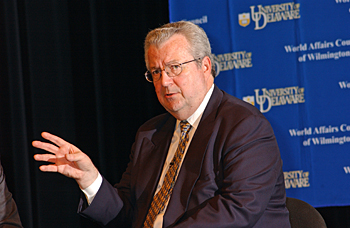His talk, “Achieving Energy Security Through Sound Public Policy,” was part of UD's spring semester Global Agenda lecture series titled, “Boiling Point: International Politics of Climate Change.”
Hofmeister described the problem as “a political outcome in which not enough or nothing happens. I would submit to you that we, as citizens of this country, are in a sense the victims of the paralysis of partisanship in our modern history.”
Referring to homeland security and economic security, Hofmeister said that those two issues have seen successful outcomes because they have been addressed and dealt with on a bipartisan basis.
“We have institutions in place that work night and day to make sure that our economic security is always looked at. There are disruptions, there are recessions, but we have the people, the leadership and institutions that have been created on a bipartisan basis that manage economic security on a steady basis,” he said.
The country does not take a bipartisan approach to solving its energy problems, Hofmeister said.
Both Republicans and Democrats have repeatedly blocked proposed energy legislation, Hofmeister said. Proposals to open up the Artic National Wildlife Refuge (ANWR) to increase the domestic supply of oil have been stymied by the Democrats, while President George W. Bush says he will veto a bill to tax oil companies to fund alternative energy research and development, Hofmeister noted, making it difficult for America to come up with stable energy solutions.
Shell Oil has formulated a 12-step program, Hofmeister said, that “enables us to move forward as a society, that enables us to maintain our economic competitiveness and our beloved lifestyle.”Shell Oil's plan calls for:
- Opening up currently restricted areas to increase domestic oil and gas production;
- Developing unconventional oil and gas resources, specifically the oil shale of Colorado and the oil sands of Canada;
- Using new technology to turn coal into synthetic gas;
- Augmenting the current supply of natural gas with liquefied natural gas;
- Developing biofuels from sources other than those needed for food, such as algae, straw and woodchips;
- Devising new wind technologies;
- Speeding the development of solar energy technology;
- Improving hydrogen energy technology by focusing on developing hydrogen fuel cell powered vehicles;
- Controlling carbon dioxide emissions nationwide, not on a state-by-state basis;
- Incentivizing alternative energy solutions to make them more appealing to average Americans;
- Promoting energy education across the nation; and
- Using more nuclear and geothermal energy.
In conclusion, Hofmeister talked about two possible international energy scenarios. He described the first scenario as a “scramble” in which nations would only try to solve their own immediate needs without thinking about the future. The second scenario Hofmeister referred to as “blueprint,” which requires technology sharing among countries and brings nations together to find common solutions to their energy problems.
“Having looked at the future 25-50 years out, it is Shell's view that only a blueprint scenario will work, and blueprint requires anything but the paralysis of partisanship,” Hofmeister said.
Article by Adam Thomas
Photos by Duane Perry



